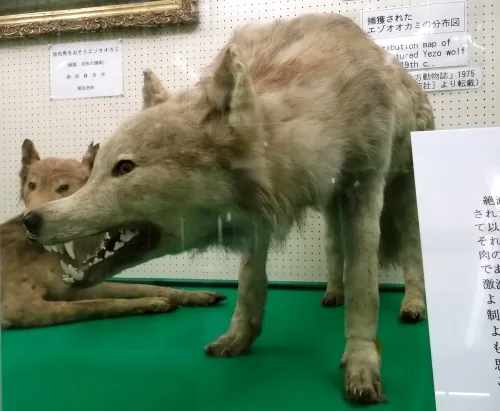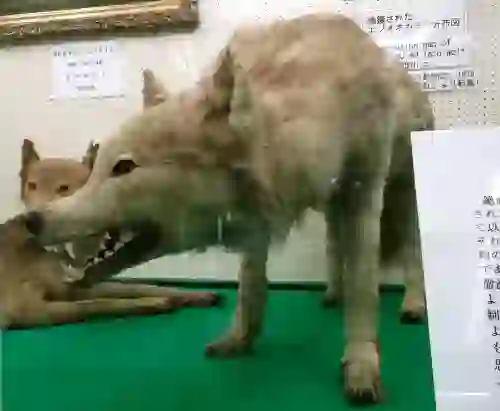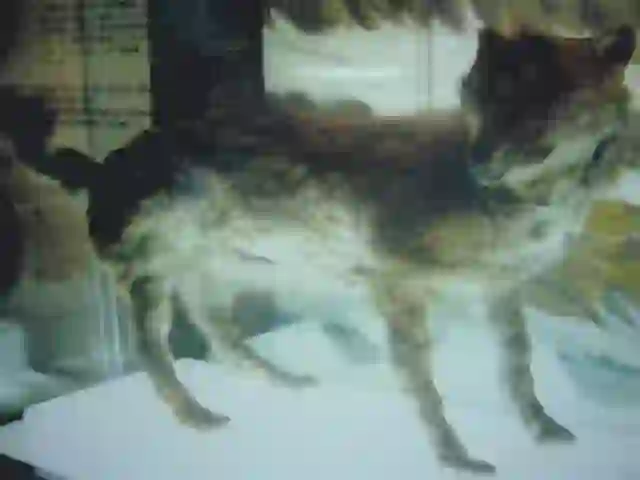
Hokkaido Wolf
Hokkaido Wolf
Hokkaido Wolf
Once upon a time, a wolf known as the Hokkaido wolf roamed the island of Hokkaido, Japan. These wolves, enduring the harsh winters of Hokkaido and preying on deer, were a vital part of the ecosystem. However, human activities drove them to extinction. Let's explore the little-known ecology of the Hokkaido wolf, the reasons behind their extinction, and the lessons left for us.
Hokkaido Wolf Basic Infomation

| Property | Value |
|---|---|
| Scientific Name | Canis lupus hattai |
| Taxonomic Status | EXTINCT |
| Rank | SUBSPECIES |
| Kingdom | Animalia |
| Phylum | Chordata |
| Class | Mammalia |
| Order | Carnivora |
| Family | Canidae |
| Genus | Canis |
| Conservation Status | EXTINCT |
| Species | Canis lupus |

Size
The Hokkaido wolf was smaller than other wolves. Their body length was estimated to be about 3.3 feet (1 meter), and they are believed to have weighed around 44 to 66 pounds (20 to 30 kilograms).
Their compact body size was an adaptation to the cold climate of Hokkaido. Their paws were also large and had well-developed pads, making it easier for them to walk on snow.

Distribution
They were once widely distributed throughout Hokkaido.
They inhabited a variety of environments, including forests, grasslands, and coastlines. However, they rapidly declined in the late 19th and early 20th centuries, and are believed to have gone extinct in 1905.
Hokkaido Wolf Q&A

What kind of wolf was the Hokkaido wolf?
The Hokkaido wolf was a subspecies of the gray wolf that once lived only on the island of Hokkaido, Japan.
They were larger than the Japanese wolf and are said to have had a longer coat. They were a vital part of the Hokkaido ecosystem, enduring the harsh winters and preying on deer. The Hokkaido wolf was a sacred animal to the Ainu people. They called it 'Horkew Kamuy', meaning 'howling god', and revered it as the god of hunting. Ainu hunters offered prayers to the Hokkaido wolf before a hunt, seeking success. They also wore bones and fur from the wolf as amulets and enshrined them in their homes as guardian deities. However, with the start of the Meiji era, Hokkaido was rapidly developed, and the Hokkaido wolf became a target for extermination as a pest. They also suffered from a rabies outbreak. And in 1905, the last Hokkaido wolf was captured, marking their extinction.

What did Hokkaido wolves eat?
Hokkaido wolves were carnivores and their primary prey was the Ezo deer.
They hunted in packs, cooperating to bring down deer. They also ate foxes, rabbits, rodents, birds, and fish. In the winter, when food was scarce, they sometimes scavenged on carrion.

[Quiz!] Was the Hokkaido wolf the same species as the Japanese wolf?
No, the Hokkaido wolf and the Japanese wolf were different species of wolves.
The Hokkaido wolf was a subspecies of the gray wolf, while the Japanese wolf was a distinct species. The Hokkaido wolf was larger and had a longer coat than the Japanese wolf. There are also differences in their skeletal structure. Although the Hokkaido wolf and the Japanese wolf once coexisted on the Japanese archipelago, they took different evolutionary paths and developed distinct characteristics.

[Quiz!] Are Hokkaido wolves truly extinct?
The Hokkaido wolf is believed to have gone extinct in 1905. However, there have been several unconfirmed reports of wolf-like creatures in Hokkaido since then.
Therefore, some people believe that the Hokkaido wolf might still be surviving somewhere. However, none of these sightings have been confirmed, and the question of whether the Hokkaido wolf is truly extinct remains a mystery. Experts continue to investigate the possibility of their survival, but so far, they have not found any traces.

Would you like to become a part of the 'Animalbook.jp'?
Turn your knowledge into Q&A and share it with the world. ※Publication will be activated after purchase. Let's share information together!
Hokkaido Wolf Type of List

Causes of the Hokkaido Wolf's Extinction
- Habitat destruction due to development: During the Meiji era, the development of Hokkaido progressed rapidly, transforming the forests and grasslands that were the Hokkaido wolf's habitat into farmland and pasture.
- Extermination as pests: Hokkaido wolves were considered pests because they preyed on livestock and were targeted for extermination. The Meiji government even offered bounties for killing wolves, leading to the deaths of many Hokkaido wolves.
- Spread of disease: In the 1880s, a rabies outbreak swept through Japan, killing many Hokkaido wolves.
- These factors combined ultimately led to the extinction of the Hokkaido wolf.
Information
Congratulations! You are the first commenter!

Create Your Favorite List!
Hokkaido Wolf
Save the animals you love! Build your own list to quickly revisit your favorites later.

Would you like to leave a comment?
※Please note: This is for the purchase of rights to post comments within the article.
Find Your Favorites!
Our shop offers a unique and attractive selection of goods themed around various animals.
Hokkaido Wolf References
Hokkaido Wolf Introduction of media used

William Harris at English Wikipedia, CC BY-SA 3.0, via Wikimedia Commons

Katuuya at the Japanese language Wikipedia, CC BY-SA 3.0, via Wikimedia Commons

Help Enrich Our Animalbook.jp with Your Media!
We are constantly looking to expand and enrich our Animalbook.jp with amazing photos and videos of animals. If you have any media that you'd like to share, please contribute and help us showcase the beauty and diversity of the animal kingdom. Your submissions will be credited and featured in our encyclopedia, reaching a wide audience of animal lovers.


















